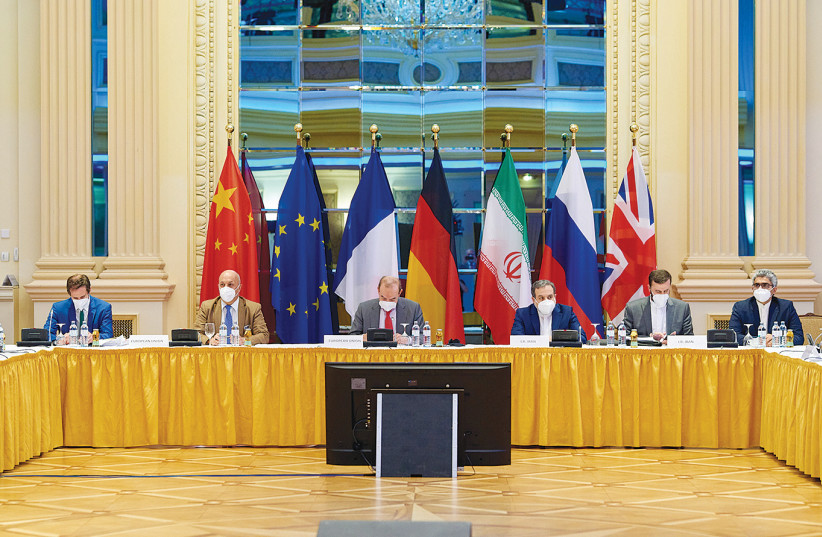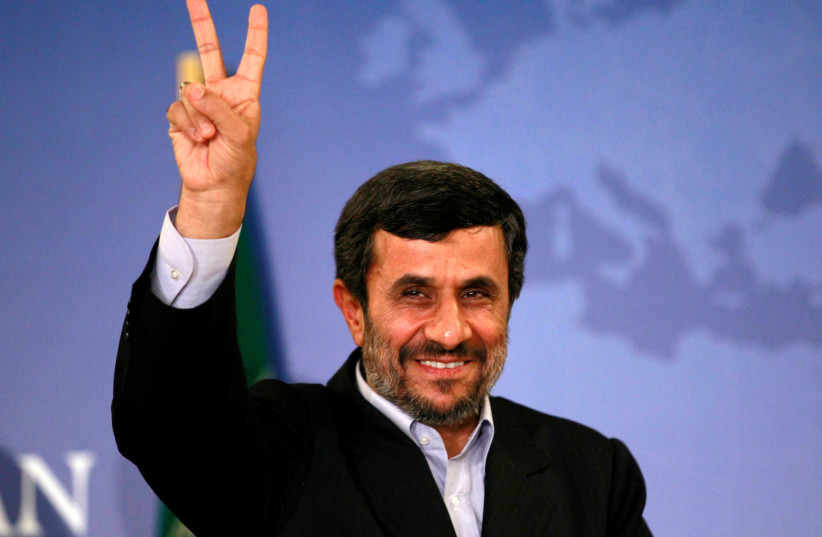There was once a tiny, but loud and scary man named Mahmoud Ahmadinejad.
As Iranian negotiators went into nuclear talks in Vienna and issued threatening statements while the talks were ongoing on Monday, it seemed they might be trying to channel his energy, yet with a more sophisticated approach.
This could make them even more dangerous.
cnxps.cmd.push(function () { cnxps({ playerId: ’36af7c51-0caf-4741-9824-2c941fc6c17b’ }).render(‘4c4d856e0e6f4e3d808bbc1715e132f6’); });
if(window.location.pathname.indexOf(“/jpost-tech/”)!=-1){ document.getElementsByClassName(“divConnatix”)[0].style.display =”none”; var script = document.createElement(‘script’); script.src = ‘https://static.vidazoo.com/basev/vwpt.js’; script.setAttribute(‘data-widget-id’,’616dd69d1b04080004ac2cc0′); document.getElementsByClassName(‘divVidazoo’)[0].appendChild(script); }else if(window.location.pathname.indexOf(“/israel-news/”) != -1 || window.location.pathname.indexOf(“/omg/”) != -1 || window.location.pathname.indexOf(“/food-recipes/”) != -1 || window.location.pathname.indexOf(“/science/”) != -1){ document.getElementsByClassName(“divConnatix”)[0].style.display =”none”; var script = document.createElement(‘script’); script.src = ‘https://static.vidazoo.com/basev/vwpt.js’; script.setAttribute(‘data-widget-id’,’60fd6becf6393400049e6535′); document.getElementsByClassName(‘divVidazoo’)[0].appendChild(script); }else if(window.location.pathname.indexOf(“/health-and-wellness/”) != -1){ document.getElementsByClassName(“divConnatix”)[0].style.display =”none”; var script = document.createElement(‘script’); script.src = ‘https://player.anyclip.com/anyclip-widget/lre-widget/prod/v1/src/lre.js’; script.setAttribute(‘pubname’,’jpostcom’); script.setAttribute(‘widgetname’,’0011r00001lcD1i_12246′); document.getElementsByClassName(‘divAnyClip’)[0].appendChild(script);}else if(window.location.pathname.indexOf(“/breaking-news/”) != -1){document.getElementsByClassName(“divConnatix”)[0].style.display =”none”;var script = document.createElement(‘script’); script.src = ‘https://player.anyclip.com/anyclip-widget/lre-widget/prod/v1/src/lre.js’; script.setAttribute(‘pubname’,’jpostcom’); script.setAttribute(‘widgetname’,’0011r00001lcD1i_12258′); document.getElementsByClassName(‘divAnyClip’)[0].appendChild(script);}
From 2005-2013, Ahmadinejad stared down and ignored then-US President George W. Bush, who had invaded Iraq.
In fact, he ignored pressure from the EU, the UN and the entire world, and barreled forward with progress in Iran’s nuclear program.
 DELEGATES WAIT for the start of talks on reviving the 2015 Iran nuclear deal, in Vienna, Austria, last month. (credit: EU DELEGATION IN VIENNA/HANDOUT VIA REUTERS)
DELEGATES WAIT for the start of talks on reviving the 2015 Iran nuclear deal, in Vienna, Austria, last month. (credit: EU DELEGATION IN VIENNA/HANDOUT VIA REUTERS)
He proudly threatened to wipe Israel off the map.
Ahmadinejad trumpeted Holocaust-denial at a level that even other Iranians might have been embarrassed to do – certainly in a public way before a global audience.
When many analysts talk about the point at which a preemptive strike on Iran’s nuclear program could have made a difference, they focus on the 2010-2012 period.
But the truth is that the real time period was during the earlier years of the Ahmadinejad era when the program was smaller, less diffuse and the knowledge gained was limited enough that it might have been able to be snuffed out like Israel did in Iraq and Syria.
But by 2009, the world had learned that Ahmadinejad had hidden the nuclear facility of Fordow deep underground.
Eventually, he started to enrich uranium to the 20% level, probably the most important jump Tehran has made in the last 15-20 years.
Nuclear experts say it is a harder jump to make even than the jumps to 60% or to 90%, which are more political decisions about timing.
So Ahmadinejad is actually responsible for successfully stonewalling the US and the entire West for several years, and much of the easy progress Iran has made this year dates back to the knowledge they gained in his era.
In some ways this approach is what Iranian President Ebrahim Raisi seems to be trying – a sort of Ahmadinejad 2.0, after his more pragmatic predecessor, Hassan Rouhani.
Demand, demand and demand more – and if you do not get what you want, stonewall for months at a time and press forward with more scary nuclear progress.
RAISI’S OPENING negotiating positions on Monday were preposterous.
There is no way that even the EU, let alone the US, would agree to lifting all sanctions (including non-nuclear) before the Islamic Republic returns to the 2015 nuclear deal’s limitations.
The Biden administration – and the EU even more so – are desperate for a deal and ready to make new concessions to Raisi beyond the JCPOA – but not that far.
But there have been signs all along that this could all be a ploy and that Raisi could be a smarter and more dangerous version of Ahmadinejad.
Ahmadinejad’s downfall was that he did not know where to stop and how to collect his concessions.
He became so enthralled with his ability to say no, that he started to tell the Russians and Chinese off as well. This led to Moscow and Beijing turning on Tehran.
In a very real way, this was what led to the 2012 sanctions that broke Iran’s economy on a whole new level, led to Iran Supreme Leader Ayatollah Ali Khamenei dropping Ahmadinejad, and eventually the regime feeling it had to make some real concessions for the JCPOA.
In contrast, Raisi has been floating a readiness for talks with the West even as a candidate before his June election as well as after his win.
At the end of Monday’s talks, Iranian negotiator Ali Bagheri Kani said he was optimistic (with Russia and the EU echoing his tone) despite all of the fire and brimstone from earlier in the day.
Some intelligence analysts believe that Raisi is committed to cutting a deal, but that he will wait until the moment where he thinks he has maximized concessions from the US and the West.
If he can get Washington to first drop its strategy of later reaching a “longer and stronger” JCPOA (which in some ways means neutering the threat of snapback sanctions); grandfather in that Tehran gets to keep all of its advanced centrifuges – and maybe do a “less for less” interim deal where much of the sanctions regime’s back gets broken when he only agrees to some nuclear limits – then what is the rush?
Early or even mid-2022 are just as good for him as mid- or late-2021 – and in the meantime, he can let the US and the West squirm about Iran’s nuclear progress.
SHORTLY BEFORE the JCPOA deal was cut on July 14, 2015, Khamenei gave a fiery speech of redlines on June 23.
One redline was that Khamenei would not agree to dismantle a single centrifuge unless economic sanctions were lifted first.
Sound familiar?
And yet, Khamenei agreed to dismantle around 75% of his centrifuges before sanctions were lifted and conceded on several other major redlines.
If Raisi is exactly like Ahmadinejad, then he may not cut a deal and instead may eventually help the world powers rally together against him – and even get a UN Security Council referral by the IAEA.
But if he is a smarter version – as it seems – all the demands now are simply bluster for cutting a better deal (for Iran) sometime in 2022 (assuming he is not actually planning to try to break out to a nuclear weapon).
If he succeeds at that, he will prove more dangerous than Ahmadinejad, as he may secure a deal that allows the Islamic Republic to rest on the nuclear threshold.

